Breadcrumb
Tufts Gordon Institute: A Year in News
In a year unlike any other, Tufts Gordon Institute’s students and alumni came together to make an impact in communities near and far. Contending with a looming pandemic, changing social landscape and other factors, the impact of their work was felt by countless people across the world and gave hope to those in times of darkness. As we look forward to the new year, we’re reflecting on their many accomplishments this year. Here are just a few of the many moments and milestones this year.
Student and Alumni Community Responds to COVID
When Tufts Medical Center received a donation of over 6,000 N95 masks in March, the donation seemed invaluable. At a time when the novel coronavirus was just beginning to be understood, staff encountered a dilemma. The elastic bands were brittle and could break before usage. In a collaborative effort between The Fletcher School’s Military Fellows program, Tufts School of Dental Medicine, Tufts School of Engineering, and local-area institutions, several MS in Innovation and Management students volunteered to retrofit the masks. MSIM Class of 2020 students Haiting Chan, Nirant Chilimbi and Lee Ann Song volunteered alongside James Aronson, MSIM ’19.
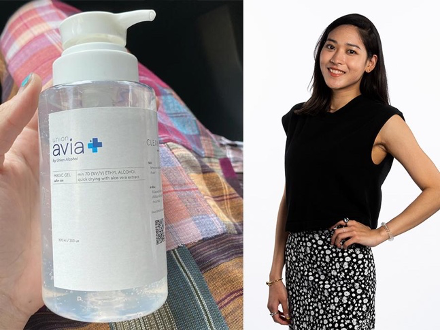
As the Spring Semester pivoted from in-person to remote instruction, Earn Khunpinit, MSIM ‘20, returned to her native Thailand, where she spent two weeks in precautionary, travel-related quarantine. While in quarantine, Earn worked to create a line of hand sanitizer solutions for disadvantaged Thai communities, avia by Union Alcohol. In addition, she received Thai FDA approval for her products.
Later in the spring, Jason Jammallo, MSEM ’12, began 3D printing PPE which included face shields and ear-savers from his Somerville apartment. By June, Jason had 3D printed more than 500 pieces of PPE for some of the nation’s largest hospitals in the Boston area.
At the time, Jason said, “I was frustrated that I wasn’t able to do much or affect much change working from home. It felt really strange to be on the sidelines, seeing healthcare workers and other people helping and dedicating so much time, energy and resources to do anything they could. Knowing that I had been working with 3D printing for over 10 years, I knew I could jump in to actually help.”
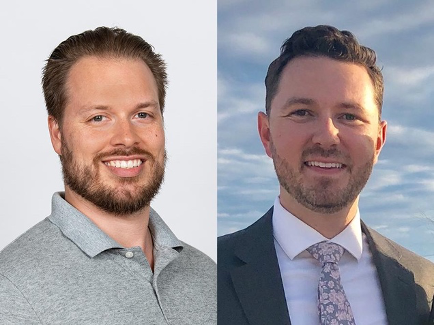
Chris Brady, MSEM ’22, and Dylan Thorp, MSEM ’21, were involved in efforts through their work at ZOLL Medical Corporation to produce 10,000 ventilators a month, a 25-fold uptick from then-recent production volumes.
Chris said, “You kind of have to take a step back and realize what we’re doing and the impact that it has. I think you sometimes get lost in how stressful the situation can be, but if you take a step back and realize this is going to save someone’s life … it gives you that motivation to grind through it and really produce the right results for the greater good.”
Dylan added, “Try to be the example of what you’re looking for in the world. The Gordon Institute has been very helpful in teaching new tools and revealing things in myself, then refining them, and saying we can take it to the next level. In order to be a really good leader, you have to understand that you have to continue to learn forever.”
Eric Campbell, MSEM ’16, worked on Hologic’s medical device, the Panther Fusion System (SARS-CoV-2 Assay) which received emergency FDA approval for the identification of the virus that causes COVID-19.
“It makes me proud to know that we’re really fighting a pandemic here that everyone knows about and the chances of getting a test with our devices are pretty high,” said Eric. “I’m thrilled to be able to support that.”
Online MS in Engineering Management Program Launches
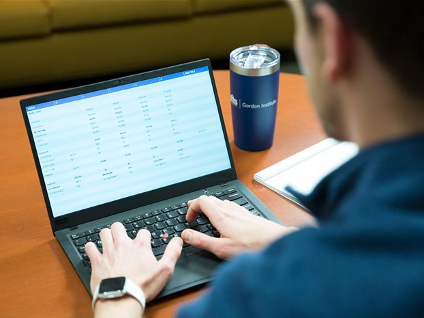
Built on over 30 years of success in the On-Campus MS in Engineering Management program, Tufts Gordon Institute launched the Online MSEM this past January, bringing the program’s transformative experience to students across the world.
In January 2021, the Online MSEM will welcome its third cohort of students as the first two cohorts reach milestones in their immersive studies while gaining the leadership skills to lead high-powered companies.
$100k New Ventures Competition Goes Virtual
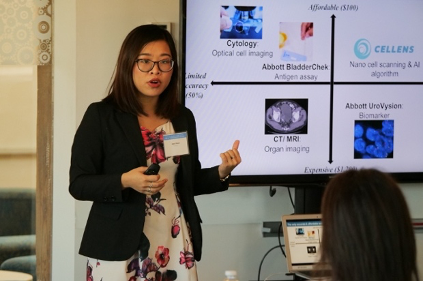
Like startups in the field, you sometimes need to pivot. For the first time, this year’s $100k New Ventures Competition was held virtually in April, bringing the experience into homes from near and far.
“One of the reasons we wanted to go virtual is that it’s in the spirit of the competition to be entrepreneurial,” said Rebekah Plotkin, TGI’s Associate Director of Administration. “We support people who are innovative and who can think on the fly, so we should be able to do it ourselves.”
Examining the Intersection of Social Justice and STEM
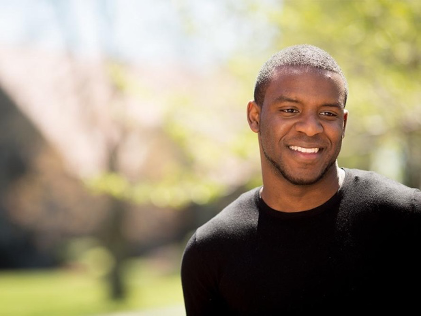
For Kofi Asante, A17, Head of Strategy and Business Development at Elroy Air, he has built upon his Tufts entrepreneurial background to reimagine logistics in reaching remote locations while advocating for greater diversity in tech leadership.
Talent Management Lecturer Rachel O’Neil hosted a recurring webinar series titled, “Karen Discusses Racism,” where corporate leaders tackled “taboo or politically incorrect” questions related to racism in an effort to dismantle it and empower attendees to create a culture of change.
“I want to help CEOs shift their mindset and have courage to create companies where inclusion and equity is a competitive advantage,” said Rachel.
In addition, The Tufts Entrepreneurship Center and Tisch College of Civic Life launched the Entrepreneurship for Social Impact minor. The minor is open to students across the campus community.
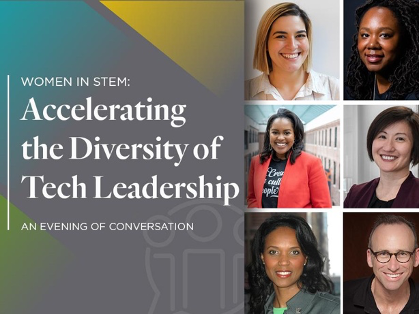
With diversity, equity and inclusion at the forefront of companies’ internal and external strategic planning across the world, what does an organization that embraces these efforts look like? This fall, a panel of industry experts came together for Women in STEM: Accelerating the Diversity of Tech Leadership, an evening of conversation.
Moderator Elaine Chen said, “Coming up as a woman in robotics, I’ve seen the world of women in STEM from the front seat and it’s pretty clear that tech has a long way to go to get to the point where we really have diversity, equity, inclusion and belonging, but we are making progress.”
Using Innovation for Good
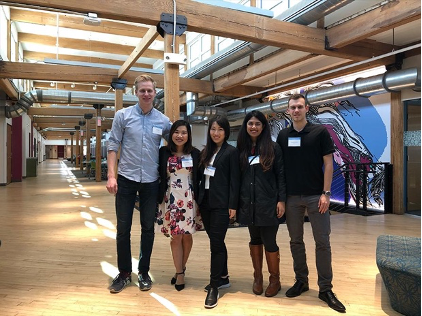
Started as an Innovation Sprint in the MSIM program, Cellens is breaking boundaries in healthcare sectors while developing a cell surface scanning technology platform. The core technology leverages the power of atomic force microscopy imaging and machine learning modeling to assist in bladder cancer diagnostics.
“We found out about current pain points, the psychological stress that comes with a diagnosis for patients and caregivers, financial struggles, and many misdiagnoses and late diagnoses due to current screening standards,” Jonas Pirkl, MSIM ’20, wrote after attending the Bladder Cancer Advocacy Network (BCAN) Summit. “While many of the stories were uplifting because they were told by survivors, there were also some heartbreaking ones … One doctor we met with at the conference mentioned a ‘huge gap in screening,’ a huge gap we are trying to fill with our technology.”
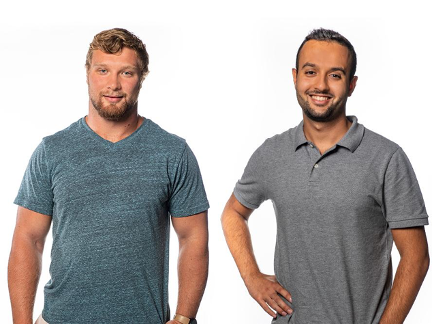
With Anodyne Nanotech, Jake Lombardo and Konstantinos Tzortzakis, both MSIM ’19, are reimagining the way that healthcare professionals administer drugs and treatments like ibuprofen and monoclonal antibodies.
For minor aches and pains, people traditionally seek relief through orally administered medications like ibuprofen. However, sustained use can stress and damage vital organs. When it comes to monoclonal antibodies (mAbs) – man-made macromolecules that act like human antibodies – delivery can be both expensive and painful for the patient, but the treatments are often lifesaving.
Anodyne Nanotech leverages microneedle technology in a patch that will be able to deliver these drugs in a more effective and healthier manner that is also convenient for patients.
To view more stories like these, visit: /news